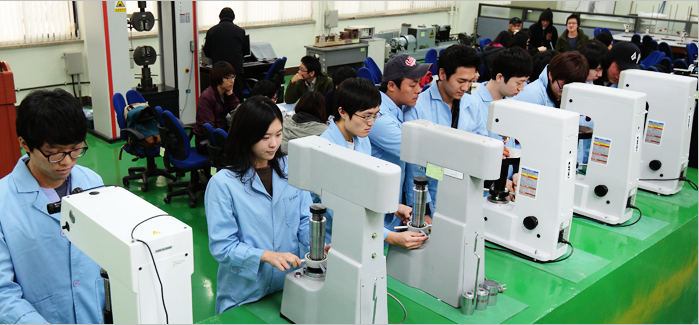232 Gongneung-ro, Nowon-gu, Seoul, korea Tel:+82-2-970-6114,7114 / Fax: +82-2-970-6088
Copyright © Seoul National University of Science&Technology. All rights Reserved
Introduction
Cultivation of talented graduates to lead a future science technology and knowledge based society
College of Engineering is a practical university-centered education with the educational purpose of producing talented graduates to lead a future science technology and knowledge based society, and with the educational goals to cultivate engineers equipped with creative thinking, problem solving skills, major knowledge application skills, comprehensive design skills, information acquisition skills, and adaptability to internationalized society.
The College of Engineering consists of mechanical affiliated departments and architecture construction affiliated departments, with 1 school (School of Architecture), 5 departments (Mechanical System Design Engineering and 4 others), 5 departments on contract (Mechanical Facility Engineering and 4 others), 1 university administrative office, and Engineering education innovation center. It is a hall for engineering education with 118 professors, 40 staff members, and around 4,995 students. The workforce produced by the 4-year College of Engineering is about 40,000 graduates, and they are playing a leading role in the development of our industries and economy as junior executives in companies, research institutes, government agencies, and other affiliated institutions.
The College of Engineering consists of mechanical affiliated departments and architecture construction affiliated departments, with 1 school (School of Architecture), 5 departments (Mechanical System Design Engineering and 4 others), 5 departments on contract (Mechanical Facility Engineering and 4 others), 1 university administrative office, and Engineering education innovation center. It is a hall for engineering education with 118 professors, 40 staff members, and around 4,995 students. The workforce produced by the 4-year College of Engineering is about 40,000 graduates, and they are playing a leading role in the development of our industries and economy as junior executives in companies, research institutes, government agencies, and other affiliated institutions.

Educational Purpose
Cultivate engineers equipped with creative thinking and problem solving skills
The most important thing for engineers in 21C science and technology is creative thinking, and the important skills required by engineers in industry is problem solving skills to find solutions for projects entrusted to them.
Cultivate engineers equipped with skills to apply major-related knowledge
Industries require engineers to apply the major-related knowledge learned in school or in general to their field and create added value.
Our College of Engineering cultivates engineers equipped with major related theory and practical knowledge as well as field application ability.
Our College of Engineering cultivates engineers equipped with major related theory and practical knowledge as well as field application ability.
Cultivate engineers equipped with practical and comprehensive design ability
Industries require comprehensive design ability: practical skill in understanding and utilizing mechanical elements, processes, and factory designs.
As components of a composite academic team, we cultivate engineers equipped with practical and comprehensive design abilities.
As components of a composite academic team, we cultivate engineers equipped with practical and comprehensive design abilities.
Cultivate engineers equipped with information acquisition skills and adaptability to internationalized society
Information acquisition skills are required to adapt to the changing information society and to have lifelong learning skills, and they need to be equipped with the knowledge to fulfill their social responsibility as engineers and adapt to internationalized society.